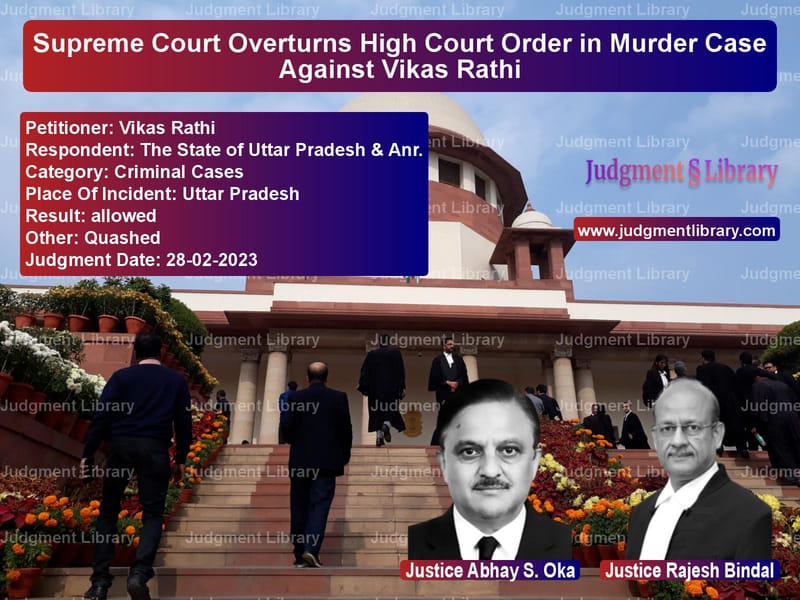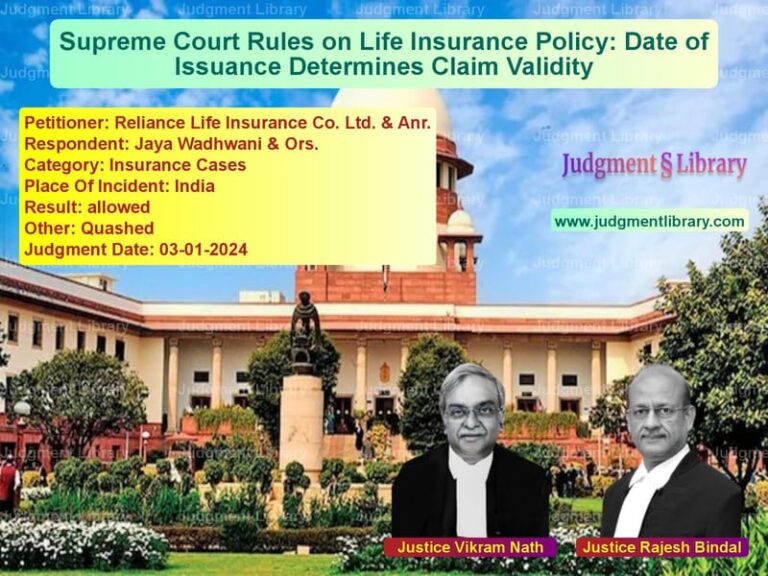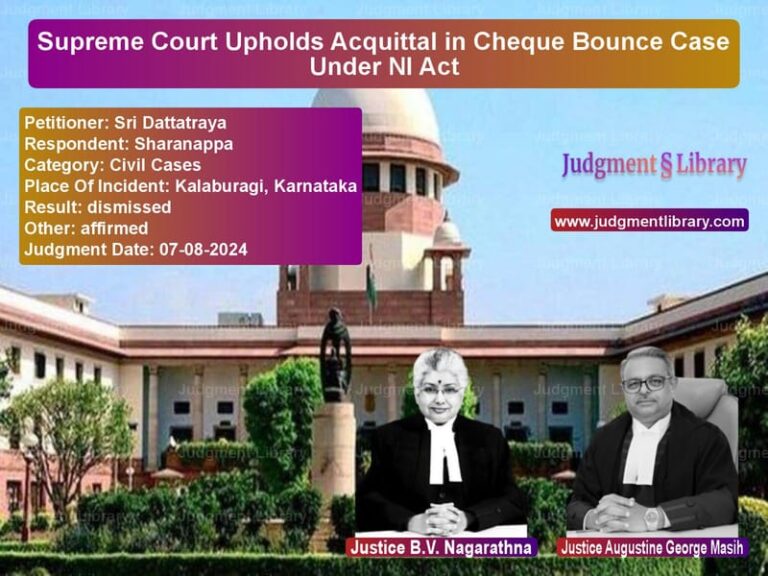Supreme Court Overturns High Court Order in Murder Case Against Vikas Rathi
The Supreme Court of India recently ruled in favor of Vikas Rathi, setting aside an order from the Allahabad High Court that had directed the trial court to reconsider summoning him as an accused in a murder case. The judgment reinforces the importance of strong and cogent evidence before exercising the power under Section 319 of the Code of Criminal Procedure (CrPC).
Background of the Case
The case revolved around an FIR registered against unknown persons concerning the murder of Bachchu Prasad, who was allegedly an employee of the appellant, Vikas Rathi. The investigation initially led to the filing of a chargesheet against two individuals: Pannelal @ Panna Lal and Ombeer Singh. The appellant, Vikas Rathi, was listed as a prosecution witness and testified as PW-6 during the trial.
After his testimony, the complainant filed an application under Section 319 CrPC, seeking to summon Rathi as an accused. The trial court dismissed this application on March 15, 2017. However, the complainant then filed a revision petition before the Allahabad High Court, which quashed the trial court’s order and remanded the case for fresh consideration. Aggrieved by this, Rathi approached the Supreme Court.
Legal Issues Considered
- Whether the power under Section 319 CrPC was exercised properly.
- Whether the evidence against the appellant was sufficient to warrant summoning him as an accused.
- Whether the High Court erred in remanding the case back to the trial court instead of evaluating the evidence itself.
Arguments of the Parties
Petitioner’s Arguments (Vikas Rathi)
- The appellant was only a prosecution witness, and no direct evidence linked him to the crime.
- The trial court had already dismissed the application under Section 319 CrPC due to a lack of strong and cogent evidence.
- The High Court should have examined the available material instead of sending the matter back for reconsideration, which prolonged the trial.
- After reviewing the evidence, the trial court acquitted all the accused on October 6, 2017, which further proved that the allegations were weak.
Respondent’s Arguments (State of Uttar Pradesh & Complainant)
- The complainant argued that there were oral allegations made against the appellant by PW-1, PW-2, and PW-3.
- The High Court acted within its powers by directing the trial court to reconsider the application.
- The trial court failed to exercise its jurisdiction properly in dismissing the application under Section 319 CrPC.
Key Observations of the Supreme Court
The Supreme Court ruled in favor of the appellant, making the following key observations:
- High Standard of Evidence Required for Section 319 CrPC: The Court reiterated that the power under Section 319 CrPC is an extraordinary one and should be exercised sparingly.
- No Direct Evidence Against the Appellant: The Court found that the oral allegations made by prosecution witnesses were vague and insufficient to justify summoning Rathi as an accused.
- Flawed Approach of the High Court: The Supreme Court held that instead of remanding the matter, the High Court should have evaluated the evidence itself.
- Acquittal of Other Accused: The Court noted that even the primary accused had been acquitted based on the evidence presented, further weakening the case against Rathi.
Key Judgment Excerpts
The Supreme Court, citing precedent, observed:
“Power under Section 319 CrPC is a discretionary and extraordinary power that should be exercised sparingly and only in cases where strong and cogent evidence exists against the accused.”
Further, the Court held:
“It is not mere suspicion that can justify summoning an accused. Only where the evidence is such that, if unrebutted, it could lead to a conviction, should such power be exercised.”
Final Judgment
Based on these findings, the Supreme Court:
- Set aside the High Court’s order remanding the matter back to the trial court.
- Upheld the trial court’s order dismissing the application under Section 319 CrPC.
- Declared that no case was made out for summoning the appellant as an additional accused.
Accordingly, the Supreme Court allowed the appeal and ruled in favor of Vikas Rathi.
Implications of the Judgment
The ruling has significant implications for criminal trials and the exercise of power under Section 319 CrPC:
- Protects Individuals from Unwarranted Prosecution: The judgment ensures that individuals are not summoned as accused based on weak or vague allegations.
- Maintains the Integrity of Section 319 CrPC: The decision reinforces that the power to summon an additional accused should be used cautiously and only when strong evidence exists.
- Ensures Efficiency in Criminal Trials: The Court’s ruling discourages unnecessary remands, which could prolong trials and delay justice.
- Prevents Judicial Overreach: The ruling emphasizes that higher courts must evaluate evidence rather than remanding cases for fresh consideration unnecessarily.
Conclusion
The Supreme Court’s decision in Vikas Rathi v. State of Uttar Pradesh is a landmark ruling that upholds the principles of fairness and due process in criminal trials. By setting aside the High Court’s order and affirming that Section 319 CrPC should be applied with caution, the Court has reinforced the need for strong evidence before summoning an individual as an accused. This ruling will serve as a crucial precedent in ensuring that criminal trials remain just, fair, and free from unnecessary delays.
Petitioner Name: Vikas Rathi.Respondent Name: The State of Uttar Pradesh & Anr..Judgment By: Justice Abhay S. Oka, Justice Rajesh Bindal.Place Of Incident: Uttar Pradesh.Judgment Date: 28-02-2023.
Don’t miss out on the full details! Download the complete judgment in PDF format below and gain valuable insights instantly!
Download Judgment: vikas-rathi-vs-the-state-of-uttar-p-supreme-court-of-india-judgment-dated-28-02-2023.pdf
Directly Download Judgment: Directly download this Judgment
See all petitions in Bail and Anticipatory Bail
See all petitions in Fraud and Forgery
See all petitions in Judgment by Abhay S. Oka
See all petitions in Judgment by Rajesh Bindal
See all petitions in allowed
See all petitions in Quashed
See all petitions in supreme court of India judgments February 2023
See all petitions in 2023 judgments
See all posts in Criminal Cases Category
See all allowed petitions in Criminal Cases Category
See all Dismissed petitions in Criminal Cases Category
See all partially allowed petitions in Criminal Cases Category







